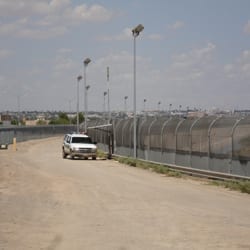After President Donald Trump signed an executive order to expand the wall on the United States’ southern border on January 25, 2017, he remarked in an interview with Fox News the next day that a stronger barrier against illegal immigration from Mexico is “good for the heart of the nation…because people want protection, and a wall protects. All you have to do is ask Israel. They were having a total disaster coming across, and they had a wall. It’s 99.9 percent stoppage.” Two days later, Israeli Prime Minister Benjamin Netanyahu stated that “President Trump is right,” tweeting that the president’s plan was a “great idea” based on the “great success” of the wall constructed along Israel’s southern border. Although the wall referenced by Prime Minister Netanyahu is a barrier between Israel and Egypt aimed at preventing migrants from North Africa from illegally entering the country, some journalists have pointed out that it isn’t entirely clear if Trump was referring to that same wall or the barrier between Israel and the Palestinian territories. Probably due to the lack of clarity with which “a wall” was mentioned, in demonstrations across Mexico and the United States protesters shouted, “From Palestine to Mexico, all the walls have got to go.” The proposed expansion of the wall has thus become a symbol of the deteriorating relations between the United States and Mexico, which Mexico believes comes at the expense of its international image.
The president’s reference to Israel in the context of an expanded wall along America’s border with Mexico was not new. Netanyahu met with then-candidate Trump in September 2016. During this meeting, Trump praised the prime minister’s 440-mile fence along its border with the Palestinian territories. Following their brief meeting, Trump campaigned for his border policy with Israel’s support, comparing his call for a strengthened border wall to Israel’s own projects.
Mexican President Enrique Peña Nieto responded to Trump’s escalating rhetoric by canceling his meeting with the U.S. president on January 26. Following Netanyahu’s tweet two days later, Mexico’s Foreign Ministry issued a statement rebuking the Israeli prime minister: “The Foreign Ministry expressed to the government of Israel, via its ambassador in Mexico, its profound astonishment, rejection and disappointment over Prime Minister Netanyahu’s message on Twitter about the construction of a border wall.” The statement went on to express the ministry’s “respect and admiration” for the Jewish people, and particularly the Mexican-Jewish community, but reiterated that “Mexico is a friend of Israel and should be treated as such by its Prime Minister.”
Trump’s comparison of Mexico to Egypt, and possibly to the Gaza Strip and the West Bank, adopts a securitized view of the United States’ own region—and could be perceived as framing Mexico as a hostile, uncooperative nation. Far from being opposed to mutual security agreements and the peaceful resolution of any conflicts, Mexico has shared intelligence about domestic drug-related violence, conducted military operations to eliminate cartel leaders, reformed its anti-crime and anti-corruption policies, increased security on its borders with Guatemala and Belize, and has come together with U.S. law enforcement authorities in an attempt to stop money laundering and secure border towns against violence. Portraying Mexico as a potential security and economic threat would ignore this recent history of cooperation between the two countries.
Trump’s comparison between the U.S. border with Mexico and Israel’s tense relations along its own borders is provocative—hence the protests of the Trump administration’s anti-immigrant, anti-Muslim, pro-Israel policies that have taken place throughout the United States. Mexican citizens have also demonstrated against the president’s rhetoric and policies, with hundreds gathering in Ciudad Juárez and Tijuana to form a human wall reaching the United States on February 17. Mexican politicians, public commentators, and media reject the idea that a porous border with Mexico represents a threat to American national security and call a border wall a hostile act.
If President Trump wishes to maintain constructive relations with Mexico’s government and people and the Mexican-American community, he must abandon his tendency to reference Israel’s complicated relationship with neighboring Arab states in discussing the U.S.-Mexico relationship. Although sensitivity is seemingly far from the president’s top priority, policymakers and other leaders are mindful of such matters, and a partnership with Mexico is worth fostering for the long term.
Jolen Martinez (’20) is an intern at the Baker Institute Mexico Center and a sophomore at Rice University majoring in political science, anthropology and history.
